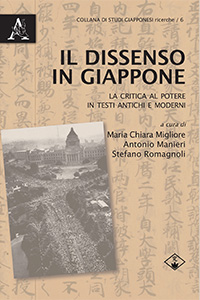Estratto da
IL DISSENSO IN GIAPPONE
La critica al potere in testi antichi e moderni
Costruzione della Storia, riscrittura e dissenso politico nei ‘dan’ con nomi veri dell’‘Ise monogatari’
IL DISSENSO IN GIAPPONE
La critica al potere in testi antichi e moderni
Costruzione della Storia, riscrittura e dissenso politico nei ‘dan’ con nomi veri dell’‘Ise monogatari’

Examining the ‘Ise monogatari’ sections containing real names (i.e., explicit reference to historical figures), this article attempts to show how these episodes were crafted to convey political dissent. Contrary to what the text in part suggests, the historical Narihira was neither a social victim of, nor an opponent to the Fujiwara’s rule. To clarify how the metamorphosis of the real poet into a detractor of the Fujiwara’s political hegemony took place, the article probes into the current theories about the formation of the ‘Ise monogatari’. Siding with the minority of scholars who question Katagiri Yōichi’s influential «three-stage theory», the article argues that the creation of the Fujiwara-opponent Narihira is the product of a «one-stage» process which took place probably around mid/second half of the 10th century. Analysis shows that Narihira’s conversion into an anti-establishment hero is the result of a methodical reworking of ‘Kokinshū’ and ‘Gosenshū’ poems, integrated with fakes, and governed by hindsight, that is by knowledge of the Ariwaras’ social decline after Narihira’s (and his brother Yukihira’s) death. Focus is brought in particular on the narrative expedients used by the author in order to turn the poetic fictions and eulogies originally composed by Narihira in honor of Fujiwara no Takaiko into a covert criticism of the Fujiwara’s matrimonial strategies, and of the political hegemony gained thereby.
| pagine: | 19-52 |
| DOI: | 10.4399/97888548920022 |
| data pubblicazione: | Marzo 2016 |
| editore: | Aracne |








